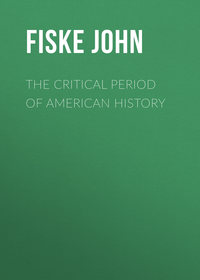 полная версия
полная версияA Century of Science, and Other Essays
The firstfruits of Vane's diplomacy were Marston Moor and Naseby, and it would be unreasonable to find fault with Mr. Hosmer for pausing to describe those battles. They are brilliant episodes in his narrative. We have nowhere seen the two battles more lucidly explained. The author has been himself a soldier, and has looked at the ground with a military eye. One quite envies him the pleasant journey, as on his tricycle he follows the route of the Ironsides over the smooth roads and smiling fields of Merry England. His pages are redolent of the mellow cheer and fragrance of the summer day under that mild northern sun. One catches, with the author, the spirit of the deadly fight, and realizes, as Naseby spire fades away in the distance, the gravity of the crisis and the completeness of the victory. Said stout old Sir Jacob Astley, when the Roundheads took him captive a few months afterward, "Gentlemen, ye may now sit down and play, for you have done all your work, if you fall not out among yourselves."
They were already falling out among themselves; how seriously, Dunbar and Worcester were by and by to show. "Their own generation," says Mr. Hosmer, "believed that the Independents drew their origin from America." Certainly there had been witnessed in Boston, in the year when Harvard College was founded, some noteworthy manifestations of Independency, and scenes had been enacted which had left a deep impress upon Sir Harry's youthful mind. In 1635 the gossips wrote: "Sir Henry Vane hath as good as lost his eldest son, who is gone into New England for conscience' sake; he likes not the discipline of the Church of England;… no persuasions of our bishops nor authority of his parents could prevail with him: let him go." The fascinating boy arrived in Boston in October, 1635, and in the following March, having won all hearts, was elected governor of Massachusetts. He witnessed the Pequot war, the beautiful heroism and rare diplomacy of Roger Williams, and the bitter strife which ensued upon the teachings of Mrs. Hutchinson. Mr. Hosmer gives a vivid picture of the life in the little colony, the theological warfare, and the passionate tears of the young man as the difficulties thickened around him. Perhaps his indiscreet threat of an appeal to the throne in favour of the Antinomians, as he sailed for England in the summer of 1637, may have served to hasten the banishment of Mrs. Hutchinson; but the lesson of toleration was already taking shape in his mind, as was clearly shown in his controversy with Winthrop. His friendly relations with Roger Williams began at the time of the Pequot war; and in 1643, when Williams visited England in quest of a charter for Rhode Island, he was Vane's guest at his house in London, and also at his country seat in Lincolnshire. It was then that Williams wrote that noble book, "The Bloudy Tenent of Persecution for Cause of Conscience," in the preface to which he thus refers to his friend: "Mine ears were glad and late witnesses of an heavenly speech of one of the most eminent of that High Assembly of Parliament: Why should the labours of any be suppressed, if sober, though never so different? We now profess to seek God, we desire to see light!"23 Mr. Hosmer gives in facsimile a touching letter from Vane to Winthrop in 1645, in which he urges his friends in New England to respect the liberty of conscience.
In 1648, in order to save the cause of liberty from losing to intrigue and chicanery all the ground it had won by the sword, the Ironsides felt themselves called upon to take things into their own hands. This period of the story, extending to the forcible dissolution of the Rump Parliament in 1653, Mr. Hosmer treats under the rubric of American England. For the moment, the spirit of Independency, which reigned supreme in Massachusetts, asserted itself in England in the temporary overthrow of the crown and the aristocracy. In this period Sir Harry appears as the opponent of the extreme measures of his party. He heartily disapproves of such irregular proceedings as Pride's Purge and the execution of the King. Here is shown the strong conservatism of temperament of this law-abiding American-Englishman. He had all the ingrained reverence of our sturdy practical race for constitutional methods, and withal a far-sighted intelligence that could discern ways of settling the difficulty which were for the moment impracticable, because his contemporaries had not grown up to them. In his mind were the rudiments of the idea of a written constitution, upon which a new government for England might be built, with powers neatly defined and limited. One fancies that in some respects he would have felt himself more at home if he could have been suddenly translated from the Rump Parliament of 1653 to the Federal Convention of 1787, in which immortal assembly there sat perhaps no man of loftier spirit than his. It was natural enough that Cromwell, whose stern common sense discerned the practical need of the moment and reluctantly fulfilled it, should cry, "The Lord deliver me from Sir Harry Vane!" In spite of this antagonism at the supreme crisis, however, the Protector recognized the worth of his opponent, and seems to have borne him no deep-seated ill will. There was no downright break between them until the Healing Question came up, in 1656.
In Vane's last years there seemed to be some good reasons for distrusting his judgment on practical questions. The element of dreamy enthusiasm always present in him began to come into the foreground as his more sober ideas and plans were thwarted. Some of his latest utterances are like the rhapsodies of the Fifth Monarchists. Herein again appears his spiritual kinship with his friends in Massachusetts. The theocratic ideal of the founders of Massachusetts, as developed freely in the American wilderness, was kept within rational bounds; but if hemmed in by such inexorable circumstances as checked the early growth of republicanism in England, it would very likely have flowered grotesquely enough in Fifth Monarchist vagaries. From Edward Johnson, of Woburn, author of the "Wonder-Working Providence," there often came the dithyrambic utterances of an extreme Fifth Monarchy man.
When Charles II. came back to his father's throne, there was but one thing to be done with such a representative republican as Sir Harry Vane. His head must come off, for there was not room enough in England to hold him and the son of Charles I. at the same time. He died on Tower Hill, with all the fearlessness and charming sweetness that had always marked his life. His memory is a precious possession for all coming generations; and the book in which Mr. Hosmer has told the story of his life, with such warm sympathy and such broad intelligence, is worthy of its subject.
January, 1889.
VII
THE ARBITRATION TREATY
After negotiations which had been pending for nearly two years, the general Arbitration Treaty between the United States and Great Britain was signed on the 11th of January [1897] by Mr. Richard Olney and Sir Julian Pauncefote, representing the two countries concerned; and on the following day the document was sent by President Cleveland to the Senate for ratification. The provisions of this important treaty may be summarized as follows: —
It is expected that differences arising between the two countries will ordinarily admit of settlement by the customary methods of diplomacy. It is only with cases where such customary methods fail that the provisions of the present treaty are concerned; and the parties hereby agree to submit all such cases to arbitration after the manner herein provided.
The "questions in difference" that are liable to arise are arranged in three grades or classes: (1) small pecuniary claims; (2) large pecuniary claims, and others not involving questions of territory; (3) territorial claims. For each of these grades there is to be a special method of settlement.
First, "all pecuniary claims or groups of claims, which in the aggregate do not exceed $500,000 in amount and do not involve the determination of territorial claims," shall be decided by a tribunal constituted as follows: "Each party shall nominate one arbitrator, who shall be a jurist of repute, and the two arbitrators so nominated shall, within two months of their nomination, select an umpire. In the event of their failing to do so within the limit of time, the umpire shall be appointed by agreement between the members of the Supreme Court of the United States and the members of the Judicial Committee of the Privy Council in Great Britain." In case these persons fail to agree upon an umpire within three months, the King of Sweden and Norway shall appoint one. Among public personages of unquestionable dignity and importance, this sovereign is as likely as any to be free from bias against either the United States of Great Britain; but should either party object to him, they may adopt a substitute, if they can agree upon one. It does not seem likely that the failure to select an umpire would often reach the stage where an appeal to the Swedish King would be necessary. The umpire, when and however appointed, shall be president of the tribunal of three, and the award of a majority of the members shall be final. Under these provisions, it may be expected that all petty claims can be disposed of without unreasonable delay, and with as little risk of unfairness as one would find in any court whatever.
Secondly, "all pecuniary claims or groups of claims exceeding $500,000, and all other matters in respect whereof either of the parties shall have rights against the other, under the treaty or otherwise, provided they do not involve territorial claims," shall be dealt with as follows: Such claims must be submitted to the tribunal of three, as above described, and its award, if unanimous, shall be final. If the award is not unanimous, either party may demand a review of it, but such demand must be made within six months from the date of the award. In such case, the appellate tribunal shall consist of five jurists of repute, no one of whom has been a member of the tribunal of three whose award is to be reviewed. Of these five jurists, two shall be selected by each party, and these four shall agree upon their umpire within three months after their nomination. In case of their failure, the umpire shall be selected (as in the former case) by the members of the Supreme Court and the Judicial Committee of the Privy Council; and if these do not agree within three months, the selection shall be left (as before) to the King of Sweden and Norway. The umpire, when selected, shall preside. The award of the tribunal of three shall be reviewed by this tribunal of five, and the award of a majority of the five shall be final.
Thirdly, "any controversy involving the determination of territorial claims shall be submitted to a tribunal of six members," three of whom shall be judges of the Supreme Court or of Circuit Courts, to be nominated by the President of the United States. The other three shall be members of the highest British court or members of the Judicial Committee of the Privy Council, to be nominated by the Queen. "Their award by a majority of not less than five to one shall be final. If there is less than the prescribed majority, the award shall also be final, unless either party within three months protests that the award is erroneous. If the award is protested, or if the members of the tribunal are equally divided, there shall be no recourse to hostile measures of any description until the mediation of one or more friendly powers shall have been invited by one or the other party." It is also provided that "where one of the United States or a British colony is specially concerned, the President or Queen may make a judicial officer of the state or colony an arbitrator."
In some cases, a question may be removed from the jurisdiction of the tribunal of three or the tribunal of five, and transferred to that of the tribunal of six. If, prior to the close of the hearing of the claim before the lower tribunal, it shall be decided by the tribunal, upon the motion of either party, that the determination of the claim necessarily involves a decision of some "disputed question of principle of grave general importance, affecting the national rights of such party as distinct from its private rights, of which it is merely an international representative," then the jurisdiction of the lower tribunal over the claim shall at once cease, and it shall be dealt with by the tribunal of six.
With regard to territorial claims, a special article defines them as including not only all claims to territory, but also "all other claims involving questions of servitude, rights of navigation, access to fisheries, and all rights and interests necessary to control the enjoyment of either's territory."
The treaty is to remain in force for five years from the date at which it becomes operative, and "until a year after either party shall have notified the other of its wish to terminate it."
The first impression which one gets from reading the treaty is that it is strictly defined and limited in its application. Yet, when duly considered, it seems to cover all chances of controversy that are likely to arise between the United States and Great Britain. Under such a treaty as this, nearly all the questions at issue between the two countries since 1783 might have been satisfactorily adjusted, – the payment of private debts to British creditors, the relinquishment of the frontier posts by British garrisons, the northeastern boundary, the partition of the Oregon territory, the questions concerning the Newfoundland fisheries, the navigation of the Great Lakes, the catching of seals in Bering Sea, the difference of opinion over the San Juan boundary, etc. Possibly some of the old questions growing out of the African slave trade might have been brought within its purview, but that is now of small consequence, since no issues of that sort are likely ever to rise again. Differences attending the future construction of a Nicaragua canal, regarded as an easement or a servitude possibly affecting vested rights, might, under a liberal interpretation, be dealt with; and one may suppose that the Venezuela question is meant to be covered, since it relates to territorial claims in which, though they may not obviously concern the United States either immediately or remotely, our government has with unexpected emphasis declared itself interested.
On the other hand, one does not seem to find in the treaty any provision which would have covered two or three of the most serious questions that have ever been in dispute between the United States and Great Britain. One of these questions, concerning the right of search and the impressment of seamen, was conspicuous among the causes of the ill-considered and deplorable War of 1812. But it may be presumed, with strong probability, that no difficulty of that kind can again arise between these two powers. The affair of the Trent in 1861 seems also to be a kind of case not provided for. But that affair, most creditably settled at a moment of fierce irritation and under aggravating circumstances, was settled in such wise as to establish a great principle which will make it extremely difficult for such a case to occur again. As for the Alabama Claims, they could apparently have been adjusted under the present treaty, as large pecuniary claims involving international principles of grave general importance.
On the whole, there seems to be small likelihood of any dispute arising between this country and Great Britain which cannot be amicably settled, with reasonable promptness, under the provisions of this new Arbitration Treaty. Once chief desideratum in any such instrument is to secure impartiality in the arbitrating tribunals, and here the arrangements made in our treaty will doubtless yield as good results as can ever be achieved through mere arrangements. In such matters, the best of machinery is of less consequence than the human nature by which the machinery is to be worked. Impartiality, not only real, but conspicuous and unmistakable, is the prime requisite in a court of arbitration. Its life and health can be sustained only in an atmosphere of untainted and unsuspected integrity. But in an age which does not yet fully comprehend the damnable villainy of such maxims as "Our country, right or wrong," gross partisanship is not easy to eliminate from human nature. Even austere judges, taken from a Supreme Court, have sometimes shown themselves to be men of like passions with ourselves. It would need but few awards made on the "eight to seven" principle, as in the Electoral Commission of 1877, to make our arbitrating tribunal the laughing-stock of the world, and to set back for a generation or two the hand upon the timepiece of civilization.
A general experience, however, justifies us in hoping much better things from the group of international tribunals contemplated in our present treaty. There is no doubt that the good work is undertaken in entire good faith by both nations; both earnestly wish to make international arbitration successful, and there is little fear that the importance of fair dealing will be overlooked or undervalued. If the present proceedings result in the establishment of a tribunal whose integrity and impartiality shall win the permanent confidence of British and Americans alike, it will be an immense achievement, fraught with incalculable benefit to mankind. For the first time, the substitution of international lawsuits for warfare will have been systematically begun by two of the leading nations of the world; and an event which admits of such a description cannot be without many consequences, enduring and profound.
For observe that the interest of the present treaty lies not so much in the fact that it provides for arbitration as in the fact that it aims at making arbitration the regular and permanent method of settling international disputes. In due proportion to the gravity of the problem is the modest caution with which it is approached. The treaty merely asks to be tried on its merits, and only for five years at that. Only for such a brief period is the most vociferous Jingo in the United States Senate or elsewhere asked to put a curb upon his sanguinary propensities and see what will happen. Nay, if we really prefer war to peace; if, like the giant in the nursery tale, we are thirsting for a draught of British blood, neither this nor any other treaty could long restrain us. As Hosea Biglow truly observes, —
"The right to be a cussed foolIs safe from all devices human."It has been rumoured that some Senators will vote against the treaty, in order to show their spite against President Cleveland and Mr. Olney. If the treaty should fail of confirmation through such a cause, it would be no more than has happened before. Members of the Sapsea family have sat in other chambers than those of the Capitol at Washington. But, as a rule, good causes have not long been hindered through such pettiness, and should the treaty thus fail for the moment, it would not be ruined, but only delayed. In any event, it is not likely to be long in acquiring its five years' lease of life. If during that time nothing should occur to discredit it, even should no cases arise to call it into operation, its purpose is so much in harmony with the most enlightened spirit of the age that it is pretty sure to be renewed. Should cases arise under it, the machinery which it provides is confessedly provisional and tentative, and upon renewal can be modified in such wise as may seem desirable. Other human institutions have been moulded by experience, and so, doubtless, it will be with international courts of arbitration.
The working of the tribunals created by the present treaty will be carefully watched by other nations than the two parties directly concerned, and should it achieve any notable success it will furnish a precedent likely to be imitated. The removal of any source of irritation at all comparable to the Alabama Claims would be, of course, a success of the first magnitude; great good, with far-reaching consequences, might be wrought by a much smaller one. Probably few readers are aware of the extent to which the arbitration at Geneva in 1872 has already served as a precedent for the peaceful solution of international difficulties.24 Already the moral effect of that event has been such as to suggest that it may hereafter be commemorated as the illustrious herald of a new era. The Geneva event was brought about by a treaty specially framed for the purpose, and might thus be regarded as exceptional or extraordinary in its nature. Still greater, then, would be the moral effect of a similar success achieved by a tribunal created under the provisions of a permanent treaty.
The commission to arbitrate between the Argentine Republic and Brazil, 1886.
Arbitration by Spain between Colombia and Venezuela, 1887.
Arbitration by the minister of Spain at Bogotá between Italy and Colombia, 1887.
Arbitration by President Cleveland between Nicaragua and Costa Rica, 1888.
Arbitration by the Queen of Spain between Peru and Ecuador, 1888.
Arbitration by Baron Lambermont between England and Germany; affair of Lamoo, 1888.
Arbitration by the Czar of Russia between France and the Netherlands; affair of the boundaries of Guinea, 1888.
Arbitration by Sir Edward Momson between Denmark and Sweden, 1888.
Compromise between the United States and Venezuela, 1890.
Compromise between Germany, the United States, and Great Britain; affair of Terranova, 1891.
Arbitration by Switzerland between England, the United States, and Portugal; affair of the railroads at Delagoa Bay, 1891.
Arbitration between Great Britain and the United States relating to the question of the delimitation of territorial power in Bering Sea, 1893.
It may be urged that arbitration cannot often succeed in dealing with difficulties so formidable as those connected with the Alabama Claims. The questions hitherto settled by arbitration have for the most part been of minor importance, in which "national honour" has not been at stake, and the bestial impulse to tear and bruise, which so many light-headed persons mistake for patriotism, has not been aroused. The London "Spectator" tells us that if the United States should ever repeat the Mason and Slidell incident, or should feel insulted by the speech of some British prime minister, there would be war, no matter how loudly the lawyers in both countries might appeal to the Arbitration Treaty. The two illustrations cited are not happy ones, since from both may be deduced reasons why war is not likely to ensue. The Mason and Slidell incident was a most impressive illustration of the value of delay and discussion in calming popular excitement. The principle of international law which the United States violated on that occasion was a principle for which the United States had long and earnestly contended against the opposition of Great Britain. A very brief discussion of the affair in the American press made this clear to every one, and there was no cavilling when our government disowned the act and surrendered the prisoners with the noble frankness which characterized President Lincoln's way of doing things. What chiefly tended to hinder or prevent such a happy termination of the affair was the unnecessary arrogance of Lord Palmerston's government in making its demand of us. What chiefly favoured it was the absence of an ocean telegraph, affording the delay needful for sober second thought. I remember hearing people say at the time that the breaking of the first Atlantic cable in 1858 had thus turned out to be a blessing in disguise! Now, should any incident as irritating as the Trent affair occur in future, the Arbitration Treaty can be made to furnish the delay which the absence of an ocean cable once necessitated; and I have enough respect for English-speaking people on both sides of the water to believe that in such case they will behave sensibly, and not like silly duellists. So, too, as regards "feeling insulted" by the speech of a prime minister, there is a recent historic instance to the point. Our British cousins may have had reason to feel insulted by some expressions in President Cleveland's message of December, 1895, but they took the matter very quietly. Had the boot been on the other leg, a few pupils of Elijah Pogram might have indulged in Barmecide suppers of gore, but there the affair would probably have ended. The reason is that deliberate public opinion in both countries feels sure that nothing is to be gained, and much is to be lost, by fighting. Under such conditions, the growing moral sentiment which condemns most warfare as wicked has a chance to assert itself. Thus the delay which allows deliberate public opinion to be brought to bear upon irritating incidents is a great advantage; and the mere existence of a permanent arbitration treaty tends toward insuring such delay.







